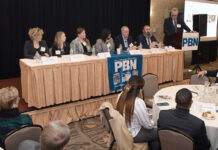
It may be convenient, even more efficient, for some employees to work away from company headquarters at a client site or from home and communicate by email, phone, texting and Skype.
For businesses, however, offsite workers can present as many challenges as opportunities.
Yahoo made headlines earlier this year by eliminating telecommuting and Best Buy followed soon after by tightening its own work-from-home policies.
While not best for every company or employee, Margie Ahearn, who manages human resources for Warwick-based NetCenergy, which provides IT services for small- and medium-sized companies, has no problem managing personnel details for about one-third of the company’s 35 employees who work offsite – she is one of them.
“My rule is I’m available by phone and email from 5:30 in the morning until 8:30 at night and I always respond,” said Ahearn, who lives in North Easton, Mass., and goes into the office on a varying schedule. “I do think it’s really important to spend time with people in person. I wouldn’t want to work from home all the time.”
Sometimes she goes into the office a couple of days a week, depending on what has to be done to meet company needs and her own standards developed from many years in human resources for several companies. Before her current job, her two previous positions were on a flexible schedule, sometimes three days in the office and the rest of her work from home.
“Telecommuting is a culture more and more companies are embracing – and I think, should embrace. It’s a work-life balance,” said Ahearn.
Her offsite human resources position for NetCenergy, which is officially a part-time consultant, initially did not excite company leadership.
“My first thought was, ‘I don’t’ like that,’ ” said NetCenergy President Don Nokes, who founded the company in 2003. “I like people where I can see them and have hallway conversations. I think there’s a lot of productivity in those interactions, even though some people might call them distractions. When employees are physically here, you can have impromptu meetings.”
NetCenergy began with three people and for the first 10 years, Nokes handled all the human resources functions himself.
“Human resources is one of the most important functions of a company like mine. All we have to sell is a set of skills and the attitude, motivation and commitment of our employees,” said Nokes.
Finally, the details of 401(k)s, selecting a health care plan and recruiting – including recruiting for one systems-engineer position that’s been open for two years – got too time-consuming, even with occasional assistance from human resources consultants and professional organizations.
Nokes and Ahearn knew each other from working at a company in the Boston area, where she was the human resources manager for a couple of related firms. Nokes knew her success in team-building, he had been involved in it, and he knew her skills in recruiting. Most recently, Ahearn was working for a medical-services company that was acquired. Keeping in touch through their professional network, Nokes asked if she was interested in joining his company.
“Don just asked if I’d be interested in helping out. He didn’t want a full-time HR person and I didn’t want to work in the office full time,” said Ahearn. “I have three sons in school, my elderly mother came to live with us this year and my husband travels for work.”
As a consultant managing human resources, on this job and her previous flexible ones, Ahearn said she hasn’t had to take a pay cut to be in the flexible arrangements.
“I’ve always been treated very well,” said Ahearn.
Nokes has changed his mind about the offsite arrangement, which began in March.
“It’s been fantastic. It allowed me to get a quality HR person that I don’t have to pay for 40 hours of work, because I don’t have 40 hours of HR work every week,” he said.
“Margie is a key person on my leadership team. She’s involved in strategic planning,” said Nokes.
“She worked with our health-insurance broker and walked me through all the proposals,” said Nokes. “She’s worked with our vice president of engineering to develop training programs. That’s been huge. For instance, we’re doing a training for our employees on confidentiality because we go into health care and financial clients and I want to make sure all of my employees know which information they come across might be confidential.
Other Rhode Island companies have established patterns for offsite employees that fit the nature of the business and make use of ever-advancing technology, including the “cloud,” where digital information can be stored and accessed.
Providence-based Residential Properties has 40 employees, as well as 160 full-time Realtors who are independent contractors. The bulk of the business is in-state, although the company has a relocation department that conducts business in-state and out-of-state.
“We don’t have Realtors that keep traditional office hours and monitor phone duty. Most of our sales associates are equipped to work in the field,” said Tom Flanagan, vice president of marketing and technology for Residential Properties.
“The combination of mobile and cloud computing enables our Realtors to be productive anywhere and have access to critical data at their fingertips,” said Flanagan.
“We also have a relocation team member who works one day a week in the office and four days a week from home,” he said. “For that person, vacation time and company meetings are done in the traditional sense. Office equipment and materials, such as printers and computers, are purchased and supported by the company.”
Technology is a critical element in the success of managing Residential Properties’ large employee and independent Realtor network.
“The combination of mobile and cloud computing has had a tremendous impact on our business,” he said.
“We have transitioned many of our internal systems to the cloud. For instance, we migrated to the enterprise version of Google Apps some years ago. This provides our team with productivity tools that can be accessed anywhere, on any device,” said Flanagan.
“We have also created a company listing presentation for the iPad that our sales associates demonstrate in the comfort of the client’s home,” said Flanagan. “Offsite employee numbers have been pretty steady for us, due to the nature of business, but I see this trend being adopted by other industries.” •












